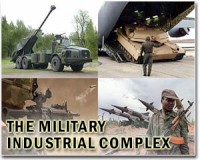 |
Abu Dhabi (AFP) Feb 22, 2011 Western arms makers, squeezed by budget cuts at home, jostled to ink deals at the biggest arms fair in the Middle East as crackdowns on anti-regime protestors claimed hundreds of lives in the region. Shiny fighter jets and armoured vehicles were showcased at the Sunday opening of the 10th International Defence Exhibition and Conference in Abu Dhabi amid reports of a bloodbath in Libya, the latest country in the region gripped by a sweeping pro-democracy uprising and ensuing violence. "The post-financial crisis reality is that today it is clearly the Middle East that is seeing the biggest growth," said Herve Guillou, president of Cassidian Systems, a subsidiary of European aviation defence group EADS. Cassidian is in talks with a local company on computerising the defence systems of the United Arab Emirates army. IDEX, which will run until Thursday, hosts more than 1,000 exhibitors with over 30 pavilions mostly belonging to the UAE, the United States, Britain, France and Germany. Nearly 50,000 visitors are expected from around the world. A naval defence industries exhibition, Navdex, is also being organised for the first time this year. The fair is taking place as the Arab world witnesses a wave of unprecedented revolts that have toppled veteran leaders in Tunisia and Egypt since the start of the year. Some governments have responded with violent repression. In Libya, rights groups put the death toll at between 200 and 400 in the space of a few days. Yemen, Bahrain, Morocco and Algeria have also faced deadly unrest demanding an end to their decades-old regimes. That has not stopped contractors from rushing to showcase their wares to Gulf states, whose defense expenditures are set to rise over fears of Iran increased spending power due to high oil prices. The six Gulf Cooperation Council countries -- Saudi Arabia, Bahrain, UAE, Oman, Qatar, Kuwait -- along with Jordan are set to spend $68 billion (49.6 billion euros) on defence in 2011, according to research firm Frost & Sullivan. Their spending is expected to reach nearly $80 billion in 2015. "Undeniably, in the Gulf there are very big budgets that we don't have in Europe," said Christian Mons, president of French Land Defence Manufacturers Association (GICAT). The dynamic market is a godsend for Western contractors as defence budgets at home are being curbed, particularly in the United States and in Western Europe. But they are faced with increasing competition from emerging economies. The Chinese, Ukrainian and South African stalls at the event expanded the most this year. Nevertheless, negotiations are also long and difficult in the region due to demanding clients. France has been in talks with the UAE since 2008 of 60 Rafale fighter jets designed by Dassault Aviation, but Abu Dhabi is demanding a revamped version of the aircraft with a more powerful engine and an improved radar. The topic of sharing the costs of touching up the jets is part of the negotiations. "A negotiation always takes several years," said Eric Trappier, who oversees the international operations of Dassault Aviation. The new question mark is what long-term effects will the recent waves of revolts have on Arab defence policies. Some say that the level of expenditures on equipment, which are spread out over years, would not be affected. "I don't think there would be a significant impact on budget," said GICAT's Mons. On the other hand, European companies that manufacture law enforcement arms often no longer have the permission of their governments to export to certain crisis zones material that could be used against citizens. French group Lacroix, which produces tear-gas or stun grenades, said exports of the products to the Middle East have been blocked, its international operations director Jean-Marc Puech said.
Share This Article With Planet Earth
Related Links The Military Industrial Complex at SpaceWar.com Learn about the Superpowers of the 21st Century at SpaceWar.com
 Global arms sales passed $400 billion in 2009: think tank
Global arms sales passed $400 billion in 2009: think tankStockholm (AFP) Feb 21, 2011 The world's 100 largest arms dealers, excluding Chinese vendors, sold weapons for $401 billion in 2009, with US vendors remaining in first place, according to a report published Monday. "Despite the continuing global economic recession in 2009, the total arms sales of ... 100 of the world's largest arms-producing companies increased by $14.8 billion from 2008," the Stockholm International Pe ... read more |
|
| The content herein, unless otherwise known to be public domain, are Copyright 1995-2010 - SpaceDaily. AFP and UPI Wire Stories are copyright Agence France-Presse and United Press International. ESA Portal Reports are copyright European Space Agency. All NASA sourced material is public domain. Additional copyrights may apply in whole or part to other bona fide parties. Advertising does not imply endorsement,agreement or approval of any opinions, statements or information provided by SpaceDaily on any Web page published or hosted by SpaceDaily. Privacy Statement |